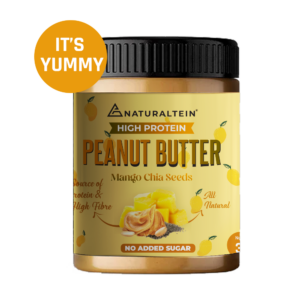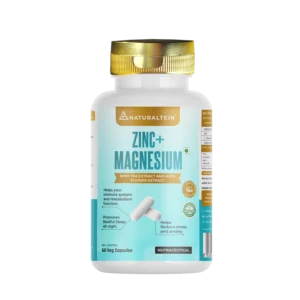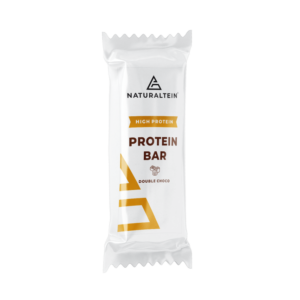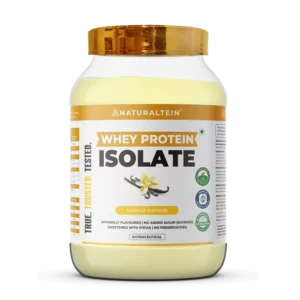In this day and age, everyone wants to make the best health decision for themselves. When it comes to protein powders, many people don’t understand which brand has the best sources of protein. Today, we are going to look at some popular protein myths and see how much truth is there in them.
At NATURALTEIN, we create protein powders made with 100% natural ingredients. You will make the right health decisions if you trust us as your fitness partner.
Now- let us look at 6 popular protein powder myths:
6 protein myths you should stop believing
Protein myth 1: Consuming too much protein is bad for your kidneys
This is a common concern, but no evidence eating large amounts of protein negatively affects kidney function in healthy people. However, some research suggests over intake of protein causes urinary calcium excretion. On the other hand, some research suggests that protein may help protect against kidney disease.
Protein myth 2: Protein’s main role is in muscle development.
According to the study, Protein’s primary role is to provide the body with the amino acids needed to create enzymes, hormones, and other important molecules. Muscle development is just one of the many things that depend on Protein.
Protein myth 3: Plant based diets don’t have enough protein
People often think they need to eat meat, but this isn’t true. Plenty of plant-based foods, such as beans, lentils, quinoa, and tofu, are high in protein(source). If you’re looking to get enough protein on a plant-based diet, there’s no need to worry.
Protein myth 4: Eating too much protein is not harmful.
While your body needs protein to function, eating too much of it can harm your health. If protein is replaced with carbs and fats, it can lead to weight gain. So while protein is an important part of a healthy diet, consume it in moderation.
Protein myth 5: Cutting back on protein is a good way to achieve weight loss
The idea that you must cut back on protein to lose weight is a myth. In fact, protein is an essential nutrient for weight loss(source). Protein helps to boost metabolism, build muscle tissue, and reduce appetite. So, if you’re trying to lose weight, include plenty of protein in your diet.
Protein myth 6: You can consume protein daily whenever you want
This couldn’t be further from the truth. When you consume protein is just as important as how much you consume. Eating protein at the wrong time can actually hinder your body’s ability to build muscle.
According to National Library of Medicine, best time to eat protein is immediately after a workout. This is when your muscles are most receptive to nutrients and need protein the most to repair and grow. Eating protein at any other time is not as effective and can even be counterproductive.
So if you’re serious about building muscle mass, ensure you get enough protein and eat it at the right times. Otherwise, you’ll just be wasting your time.
Does too much protein make you tired?
Some people swear by a high protein diet, while others find that too much protein makes them feel sluggish. So what’s the verdict?
There is no one-size-fits-all answer to this question, as everyone’s body reacts differently to different amounts of protein. However, a few things to remember may help you figure out if you’re eating too much protein.
First, it’s important to understand that protein is a macronutrient, meaning that your body needs it in large amounts to function properly. Your body uses protein to build muscle mass, repair tissue, and make hormones.
That said, you don’t need to eat a ton of protein to meet your body’s needs. The Recommended Dietary Allowance (RDA) for protein is 0.36-0.06 grams per pound of body weight. About 46-75 grams of protein per day for an adult woman and 56-91 grams of protein per day for an adult man. Most people easily meet this protein requirement with diet alone.
So if you’re not eating a ton of protein but still feeling tired, other factors may be at play. For example, if you’re not getting enough sleep or are under a lot of stress, that can make you feel tired even if you’re eating enough amounts of protein.
Additionally, it’s important to note that too much of any macronutrient can harm your health. Too much protein can lead to weight gain and other health problems.
Side effects of excessive protein intake
While protein is an essential part of the diet, it’s important to be aware of the potential risks associated with consuming too much of it.
- Weight gain: Consuming too much protein can lead to weight gain, as the body will convert excess essential amino acids into fat.
- Bad breath: High protein diet can cause bad breath, as the body produces ammonia when breaking down protein.
- Constipation: A high protein diet can also lead to constipation, as protein can bind with water and form stool.
- Diarrhea: The effect of excess protein in the body intake can also cause diarrhea, as the body may have difficulty digesting all amino acids.
- Dehydration: Protein requires a lot of water to metabolize so a high protein diet can lead to dehydration.
- Kidney damage: The kidneys are responsible for filtering waste products from the blood, and a high protein diet can put a strain on them. If you have kidney disease or are at risk, you should be especially careful with your protein intake.
There are high protein foods side effects such as heart disease and cancer. So it’s important to consult a healthcare expert or registered dietitian before making any drastic changes to your diet.
How to get protein in food?
There are many ways to get protein via food. You can find it in animal products such as meat, milk, and eggs. You can also get protein sources such as beans, lentils, nuts, and seeds. If you want to increase your protein intake, you may consider adding these foods to your diet.
1. Meat
According to the study, meat is a good source of protein containing all the essential amino acids your body needs to build and maintain muscle tissue. You can find protein in both lean and fatty cuts of meat. Leaner meats, such as chicken and turkey, are lower in fat and calories but still provide a good amount of protein. Fatty meats contain more fat and calories but are also good sources of protein.
2. Milk
Milk is another excellent source of protein. It’s a complete protein containing all the essential amino acids your body needs. Milk is also a good source of calcium, which is important for bone health.
3. Eggs
One large egg contains about 6.3 grams of protein(source). Eggs are also a good source of Vitamin D and small amounts of all vitamins and minerals, such as calcium, iron, manganese, vitamin E, folate, potassium, zinc, and many more.
4. Beans
Beans are a good source of protein. They’re also high in fiber, which can help with digestion. You can find beans that come in wide varieties, such as black beans, kidney beans, and lentils.
5. Lentils
Lentils are another type of bean that’s a good source of protein. They’re also high in fiber and contain various vitamins and minerals.
6. Nuts
According to NCBI, Nuts are good sources of protein, fiber, healthy fats, vitamins, and minerals. They’re a great snack option and can be added to salads or used as a topping for yogurt or cereal.
7. Seeds
Seeds are good sources of protein, fiber, antioxidant polyphenols, and healthy fats. They can be eaten individually as a snack or added to smoothies, yogurt, or cereal.
8. Protein powder
Protein powder is a convenient way to increase your protein intake. It’s typically made from whey, casein, or soy and can be mixed with water or milk. Protein powder can make shakes, smoothies, or baking recipes.
Conclusion: Protein myth
You can drive away any vegetarian protein myth if you have the correct knowledge. As the leading protein supplement brand, we have done our part by shedding light on some common myths about protein powder and other questions.
You must choose from an authentic manufacturer who makes no compromise on quality.
At NATURALTEIN, we have always been working for the betterment of our consumers.
FAQs: Protein myth
Protein helps our bodies build and repair tissues, produce enzymes and hormones, and boost immunity. While protein is necessary for good health, eating too much can lead to unhealthy side effects.
Some people believe that if you are consuming more protein than your body needs, it may contribute to osteoporosis and kidney problems. If you have a medical condition that requires you to limit your protein intake or try to lose weight, it’s important to know how much protein is in the foods you eat. Use this information to help you make healthy choices about protein consumption.
No, excess protein does not turn into fat, but it gets stored as fat. However, if you consume too many calories while trying to increase your protein intake, you may gain weight over time. The surplus of amino acids is excreted rather than stored as fat. Therefore, consuming excess protein will not lead to weight gain from fat storage. Instead, any weight gain would come from consuming too many calories overall. So, if you’re trying to increase your protein intake, be sure to do so in a way that doesn’t cause you to consume too many calories overall.
Protein is an essential nutrient that helps our bodies to function properly. It is made up of amino acids, the building blocks of our cells and tissues. You can get protein in all foods, including meat, poultry, fish, eggs, dairy, beans, lentils, nuts, and seeds. Most people get enough protein from their diet, but some people may need to increase their intake if they are athletes or bodybuilders or have certain medical conditions.
Protein is important for many reasons as it helps your body to repair and grow new tissue. It helps to produce enzymes and hormones and provides a source of energy. Protein also works for proper immune function.
Most people get enough protein in their diet from food sources such as meat, poultry, fish, eggs, dairy, and beans. However, some people may need a protein supplement to ensure they’re getting enough.
Protein supplements come in many forms, including powders, shakes, and bars. Whey protein is the most popular protein supplement, but plant based proteins are also available.
At NATURALTEIN, we provide two types of whey protein powders made from natural ingredients that the third-party lab tests and certifies. One is whey protein concentrate, and another is whey protein isolate.
The belief that we need to consume complete proteins in order to get all the essential amino acids our bodies need is a myth. In reality, as long as we eat a variety of protein-containing foods throughout the day, our bodies can synthesize all the essential amino acids we need.
There are many benefits to getting our protein from whole food sources instead of supplements. Whole foods are more nutrient-dense and provide our bodies with other important nutrients like fiber, vitamins, and minerals. They also tend to lower calories, fat, and sodium than protein supplements.
Assuming you’re trying to hit a target of 60 grams/day of protein intake. There are a few key ways to ensure you’re consuming enough protein daily.
First, include protein-rich foods at every meal. Good protein sources include lean meats, poultry, fish, eggs, dairy, beans, legumes, and nuts.
Second, if you snack during the day, choose protein-rich snacks such as yogurt, trail mix, or whole grain crackers with peanut butter.
Third, make sure you’re drinking enough liquid. Protein shakes and smoothies are a great way to get in an extra dose of protein, and they’re especially helpful if you’re working out frequently.
Fourth, don’t forget about protein powder. Protein powder can be added to shakes, smoothies, or baked goods to increase protein content.
Finally, if you’re having trouble meeting your protein needs from food alone, consider taking multivitamins. They can help you ensure you’re getting all the essential nutrients you need, and they’re especially convenient if you’re on the go. At NATURALTEIN, you can buy multivitamins. There are many benefits you can get like it reduces fatigue, strengthens your nervous system, contains all your essential vitamins, etc.
It’s easy to ensure you’re getting enough protein daily. You can reach your goals and maintain health by including protein-rich foods at every meal and snack.





